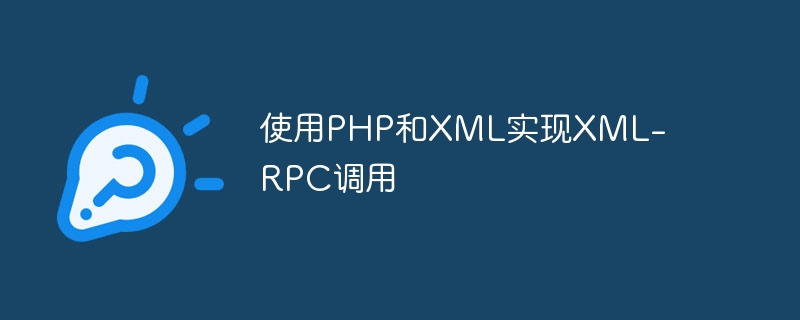

Implementing XML-RPC calls using PHP and XML
XML-RPC is a remote procedure call (RPC) protocol that communicates over the HTTP protocol, using XML as data transfer format. In PHP, we can use the built-in XML-RPC extension to implement XML-RPC calls.
First, we need to install and enable PHP’s XML-RPC extension. You can install it by modifying the php.ini file or using the following command:
sudo apt-get install php-xmlrpc
After the installation is complete, we can start using XML-RPC to make calls.
First, we need to create an XML-RPC client object. You can use the xmlrpc_client() function to create:
$client = new xmlrpc_client($url);
where $url is the URL of the XML-RPC service.
Next, we need to create a method call. We can use the xmlrpc_encode_request() function to create an XML-RPC request:
$request = xmlrpc_encode_request($method, $params);
Here $method is the name of the method to be called, and $params are the parameters of the method.
We can then send XML-RPC requests and receive responses. You can use the xmlrpc_call() function to send the request and the xmlrpc_decode() function to decode the response:
$response = xmlrpc_call($client, $request); $result = xmlrpc_decode($response);
Finally, we can process based on the returned results. If the call is successful, $result will contain the method's return value. Otherwise, $result will contain an error message.
Here is a complete example, assuming we want to call a method called "add" that accepts two integer parameters and returns their sum:
<?php
$url = 'http://example.com/xmlrpc/server.php';
$client = new xmlrpc_client($url);
$method = 'add';
$params = array(
new xmlrpcval(3, 'int'),
new xmlrpcval(5, 'int')
);
$request = xmlrpc_encode_request($method, $params);
$response = xmlrpc_call($client, $request);
$result = xmlrpc_decode($response);
if (xmlrpc_is_fault($result)) {
$error = "Fault: " . $result['faultString'];
echo $error;
} else {
$sum = $result->scalarval();
echo "Sum: " . $sum;
}
?>In the above example , we created an XML-RPC client object and called a method named "add", passing parameters 3 and 5. If the call is successful, their sum will be printed.
In summary, the combination of PHP and XML-RPC provides a simple and effective remote procedure call method. By using the built-in XML-RPC extension, we can easily create XML-RPC requests, send requests and receive responses. This provides more possibilities for communication across networks. Hope this article helps you!
The above is the detailed content of Implementing XML-RPC calls using PHP and XML. For more information, please follow other related articles on the PHP Chinese website!